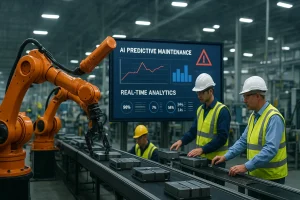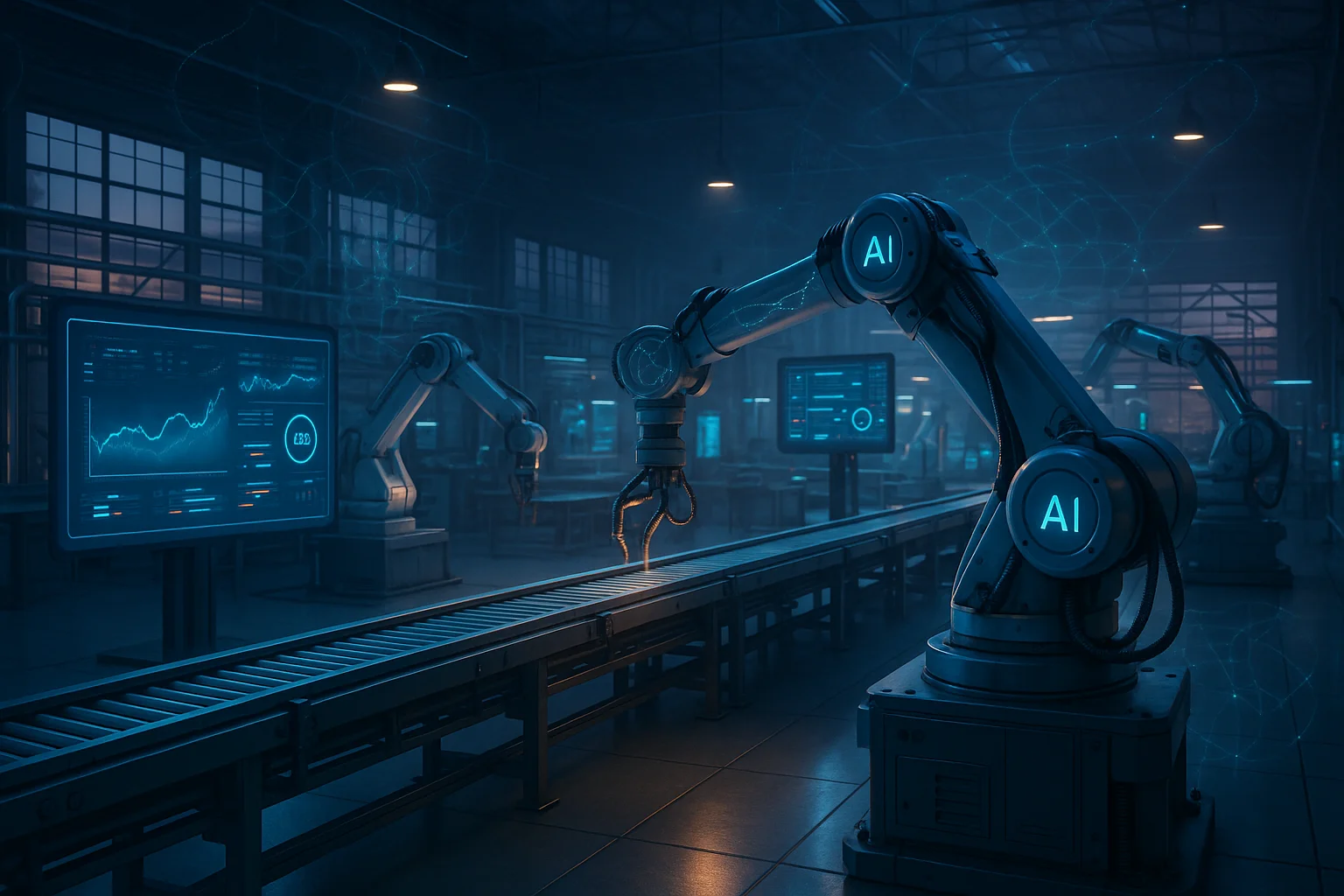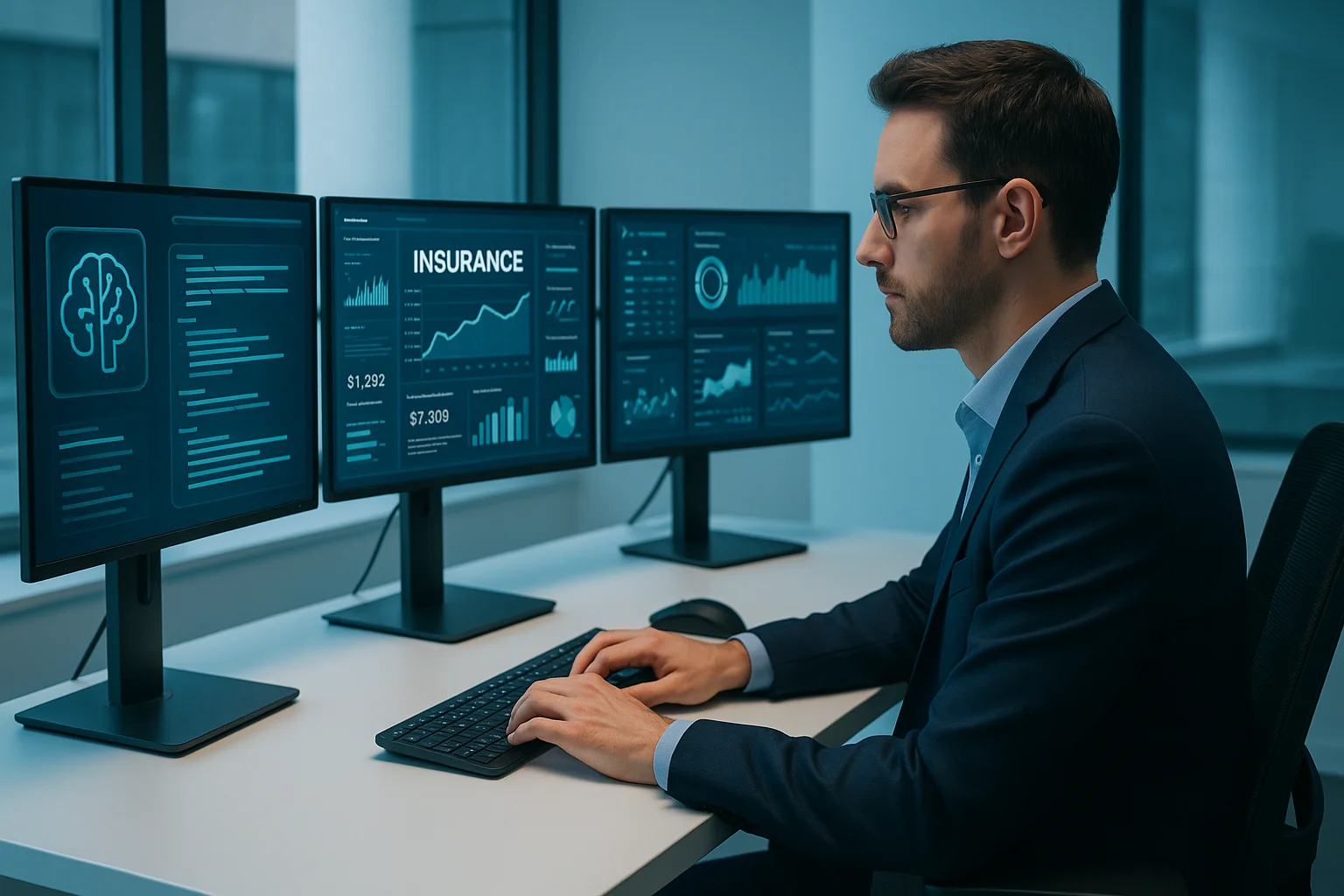Not long ago, AI sounded like something out of a Sci-fi movie – the kind of technology only business giants could afford. Fast forward to today, it has become a driving force behind every industry. Whether it’s streamlining customer support, chatbots answering your questions in seconds or improving healthcare diagnostics, AI is helping companies work smarter and faster. It’s no longer just a future possibility – it’s here, shaping how businesses grow and compete.
Let’s dive into 10 real-world AI business use cases that show exaclty how companies are adopoting AI to boost efiiciency, improve customer experiences and stay ahead of the competition.
Why AI Matters in Business Today
AI isn’t just a tech upgrade — it’s becoming a core driver of competitive advantage. Businesses that embrace AI are finding new ways to cut costs, unlock insights from data, and deliver highly personalized experiences that keep customers coming back.
And the numbers back it up. The global AI market is projected to grow from $621.19 billion in 2024 to $2.74 trillion by 2032, with North America leading the way with 41% of the market share. In other words, this isn’t tomorrow’s technology—it’s today’s reality, fundamentally reshaping how businesses deliver value, cut costs, and build new revenue streams
The 10 Real-World Business Use Cases of AI
AI in Customer Service (Chatbots & Virtual Assistants)
 Customer service is one of the areas where AI has made the biggest impact. Instead of customers being stuck on hold or waiting days for an email reply, AI chatbots and virtual assistants now handle simple queries instantly. From checking an order status to resetting a password, these tools use natural language processing to understand intent and provide fast, accurate answers. They keep improving with every interaction, learning from customer behavior to deliver more personalized support over time.
Customer service is one of the areas where AI has made the biggest impact. Instead of customers being stuck on hold or waiting days for an email reply, AI chatbots and virtual assistants now handle simple queries instantly. From checking an order status to resetting a password, these tools use natural language processing to understand intent and provide fast, accurate answers. They keep improving with every interaction, learning from customer behavior to deliver more personalized support over time.
Companies like Bank of America, with its digital assistant Erica, have already logged more than 1.5 billion interactions, while platforms such as Zendesk use AI to help agents prioritize tickets and speed up resolution. The result is a win–win: businesses cut costs and scale their support teams, while customers enjoy 24/7 help that’s quick and frustration-free.
AI in Retail (Personalized Shopping & Recommendations)
 Retail has been completely reshaped by AI-driven personalization. Rather than browsing endless catalogs, shoppers are now guided toward products and offers that match their tastes and needs. Behind the scenes, algorithms analyze browsing history, purchase patterns, and even micro-signals like how long a customer hovers over a product. This creates shopping experiences that feel tailored and relevant, making it easier for people to discover what they’ll love.
Retail has been completely reshaped by AI-driven personalization. Rather than browsing endless catalogs, shoppers are now guided toward products and offers that match their tastes and needs. Behind the scenes, algorithms analyze browsing history, purchase patterns, and even micro-signals like how long a customer hovers over a product. This creates shopping experiences that feel tailored and relevant, making it easier for people to discover what they’ll love.
Amazon’s recommendation engine alone accounts for as much as 35% of its revenue, while Netflix relies heavily on AI-powered personalization to keep viewers engaged and reduce churn. By turning data into personalized recommendations, retailers boost sales, improve customer loyalty, and keep buyers coming back — proving that personalization isn’t just nice to have; it’s essential for growth.
AI in Healthcare (Diagnostics & Predictive Analytics)
 In healthcare, AI is doing what was once thought impossible — detecting diseases earlier and with greater accuracy. From analyzing X-rays and MRI scans to spotting early signs of cancer or heart disease, AI systems can process vast amounts of medical data in seconds, often with accuracy that rivals human specialists. Predictive analytics is also transforming drug development, cutting years off traditional research timelines.
In healthcare, AI is doing what was once thought impossible — detecting diseases earlier and with greater accuracy. From analyzing X-rays and MRI scans to spotting early signs of cancer or heart disease, AI systems can process vast amounts of medical data in seconds, often with accuracy that rivals human specialists. Predictive analytics is also transforming drug development, cutting years off traditional research timelines.
Startups like PathAI are using deep learning to improve pathology diagnostics, while IBM Watson Health has supported oncologists with treatment recommendations tailored to individual patients. The promise here isn’t just efficiency — it’s about saving lives, reducing misdiagnosis, and making advanced healthcare accessible on a global scale.
AI in Finance (Fraud Detection & Risk Management)
 Financial services rely on trust — and AI is playing a vital role in protecting that trust. Every day, banks and payment processors run millions of transactions, and AI systems monitor them in real time to spot unusual behavior. Machine learning models learn from patterns of fraud, adapting quickly to new techniques criminals use, and flagging suspicious transactions before damage occurs.
Financial services rely on trust — and AI is playing a vital role in protecting that trust. Every day, banks and payment processors run millions of transactions, and AI systems monitor them in real time to spot unusual behavior. Machine learning models learn from patterns of fraud, adapting quickly to new techniques criminals use, and flagging suspicious transactions before damage occurs.
Mastercard and PayPal are two of the most notable examples, using AI to process and secure transactions for millions of customers worldwide. These systems don’t just cut fraud losses; they also build confidence among customers who know their money is safe, which is priceless in today’s digital economy
AI in Marketing (Targeting & Content Creation)
 Marketing has always been about reaching the right audience with the right message, and AI has taken this to a whole new level. By analyzing browsing data, purchase history, and even social media activity, AI can predict what content or product a customer is most likely to engage with. Beyond targeting, AI is now creating the actual marketing content too — from ad copy to images and even videos.
Marketing has always been about reaching the right audience with the right message, and AI has taken this to a whole new level. By analyzing browsing data, purchase history, and even social media activity, AI can predict what content or product a customer is most likely to engage with. Beyond targeting, AI is now creating the actual marketing content too — from ad copy to images and even videos.
Coca-Cola has used AI to analyze consumer sentiment and optimize campaign strategies, while AI platforms like Jasper AI are helping brands produce personalized content at scale. The outcome is clear: smarter targeting, higher engagement, and marketing teams that can spend less time guessing and more time executing strategies that work.
AI in Manufacturing (Predictive Maintenance & Automation)
 Factories are turning to AI to keep machines running smoothly and prevent costly breakdowns. Predictive maintenance uses AI to monitor equipment in real time, flagging potential issues before they cause downtime. Instead of reacting to failures, manufacturers can now plan repairs proactively, saving both time and money.
Factories are turning to AI to keep machines running smoothly and prevent costly breakdowns. Predictive maintenance uses AI to monitor equipment in real time, flagging potential issues before they cause downtime. Instead of reacting to failures, manufacturers can now plan repairs proactively, saving both time and money.
Industry leaders like Siemens & General Electric (GE) are already embedding AI into their manufacturing operations. By combining robotics, sensors, & AI-driven analytics, they’ve managed to cut maintenance costs, reduce unplanned downtime, make production more efficient than ever before
AI in Human Resources (Talent Acquisition & Retention)
 Recruitment is another area where AI is making life easier. Instead of manually screening hundreds of resumes, AI systems can filter candidates based on skills, experience, and even cultural fit. Beyond hiring, AI is also helping HR teams track employee engagement, predict turnover, and suggest ways to improve retention.
Recruitment is another area where AI is making life easier. Instead of manually screening hundreds of resumes, AI systems can filter candidates based on skills, experience, and even cultural fit. Beyond hiring, AI is also helping HR teams track employee engagement, predict turnover, and suggest ways to improve retention.
LinkedIn uses AI extensively in its job-matching features, connecting millions of professionals with opportunities that fit their skills and aspirations. For companies, this means faster hiring decisions, reduced bias in the recruitment process, and better long-term employee satisfaction
AI in Supply Chain & Logistics (Route Optimization)
 Managing supply chains has always been complex, but AI is bringing unprecedented efficiency to the process. From predicting inventory demand to planning the fastest delivery routes, AI helps businesses minimize waste and deliver goods more reliably. Algorithms can account for variables like weather, fuel costs, and traffic to make smarter logistics decisions.
Managing supply chains has always been complex, but AI is bringing unprecedented efficiency to the process. From predicting inventory demand to planning the fastest delivery routes, AI helps businesses minimize waste and deliver goods more reliably. Algorithms can account for variables like weather, fuel costs, and traffic to make smarter logistics decisions.
UPS’s ORION system is a prime example — it optimizes 55,000 delivery routes every day, saving millions of gallons of fuel annually and cutting costs significantly. With these tools, companies can keep shelves stocked, reduce delivery times, and make logistics operations leaner and greener.
AI in Cybersecurity (Threat Detection & Response)
 As cyber threats become more sophisticated, businesses are turning to AI for protection. Instead of relying solely on traditional security systems, AI models continuously scan networks, detect unusual behavior, and respond to potential breaches in real time. They learn and adapt as new threats emerge, making them more effective with every attempt to infiltrate a system.
As cyber threats become more sophisticated, businesses are turning to AI for protection. Instead of relying solely on traditional security systems, AI models continuously scan networks, detect unusual behavior, and respond to potential breaches in real time. They learn and adapt as new threats emerge, making them more effective with every attempt to infiltrate a system.
Firms like Darktrace use self-learning AI to spot anomalies without needing pre-programmed rules, while CrowdStrike leverages AI to detect and neutralize endpoint threats. This proactive defense means companies can act before attackers do, keeping sensitive data safe and business operations secure
AI in Entertainment & Media (Content Creation & Curation)
 Entertainment is another space where AI is shaping what we watch, listen to, and read. Recommendation engines are at the heart of platforms like Netflix and Spotify, learning from user behavior to serve up personalized playlists and binge-worthy shows. On the production side, AI tools are automating tasks like video editing, scriptwriting, and even generating music.
Entertainment is another space where AI is shaping what we watch, listen to, and read. Recommendation engines are at the heart of platforms like Netflix and Spotify, learning from user behavior to serve up personalized playlists and binge-worthy shows. On the production side, AI tools are automating tasks like video editing, scriptwriting, and even generating music.
Netflix relies on AI not just for recommendations but also to decide which original shows to produce, while Spotify’s Discover Weekly uses algorithms to curate music for millions of listeners. Even news outlets like the Associated Press are using AI to generate earnings reports. The result is content that feels custom-made for each user, keeping them engaged while cutting production costs
What Businesses Can’t Ignore
AI is no longer just a shiny add-on to existing systems — it’s proving to be a real game-changer across industries. Companies that embrace it are cutting costs, automating routine tasks, and freeing up teams to focus on high-value work. At the same time, AI is helping businesses deliver hyper-personalized customer experiences that build stronger relationships and loyalty.
The best part? You don’t need to be a Fortune 500 company to see results. With cloud-based tools, off-the-shelf AI platforms, and plug-and-play integrations, even small and mid-sized businesses can start reaping the benefits. The real question isn’t whether to adopt AI — it’s how quickly you can bring it into your workflows before your competitors leave you behind.
Things to Keep in Mind
Of course, adopting AI doesn’t come without challenges. Data privacy is one of the biggest concerns, with regulations evolving quickly and customers demanding more transparency about how their information is used. There’s also the reality of upfront investment—AI solutions can require both time and money before they deliver full value.
Another important factor is people. AI works best when paired with skilled professionals who understand how to deploy and monitor it effectively. And beyond the technical hurdles, there’s an ethical responsibility to ensure AI is used fairly, without bias or harm. These are considerations every business leader should weigh before going all-in.
Why Now Is the Time to Act

The reality is, AI is no longer a “nice to have” — it’s becoming the backbone of modern business. Waiting on the sidelines only means falling behind competitors who are already using AI to cut costs, move faster, and deliver better customer experiences. The gap between early adopters and late movers is widening, and businesses that hesitate risk losing both efficiency and market share.
The good news? You don’t need to overhaul everything at once. The smartest approach is to start small: introduce AI in one area of your operations, learn from the results, and expand from there. From customer support to marketing, finance to logistics, every step you take compounds into a competitive edge. That’s where our AI Services can help you get started strategically. The bottom line is clear — AI isn’t just shaping the future, it’s defining the present. And the best time to act is right now.
Build custom AI solutions that deliver real business value
From strategy to deployment, we help you design, develop, and scale AI-powered software that solves complex problems and drives measurable outcomes.



